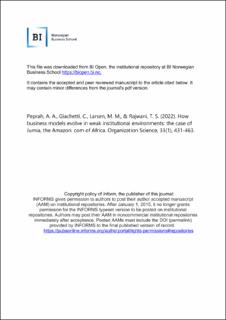How Business Models Evolve in Weak Institutional Environments: The Case of Jumia, the Amazon.Com of Africa
Peer reviewed, Journal article
Accepted version

View/
Date
2021Metadata
Show full item recordCollections
- Scientific articles [2189]
Abstract
We advance research on the antecedents of business model design by integrating institutional and imitation theories to explore how the business model of new ventures evolves in a weak institutional environment. Based on a case study of Jumia—an online retailing company in Africa established with the aim to emulate the success of Amazon.com—we propose a process model entitled “imitate-but-modify” that explains how business models evolve through four distinct phases (i.e., clarification, legitimacy, localization, and consolidation). In essence, this model explains how new ventures surrounded by considerable uncertainty deliberately seek to learn vicariously by imitating the business model template of successful firms. However, because of significant institutional voids, the ventures’ intentional imitation is progressively replaced by experiential learning that blends business model imitation with innovation.